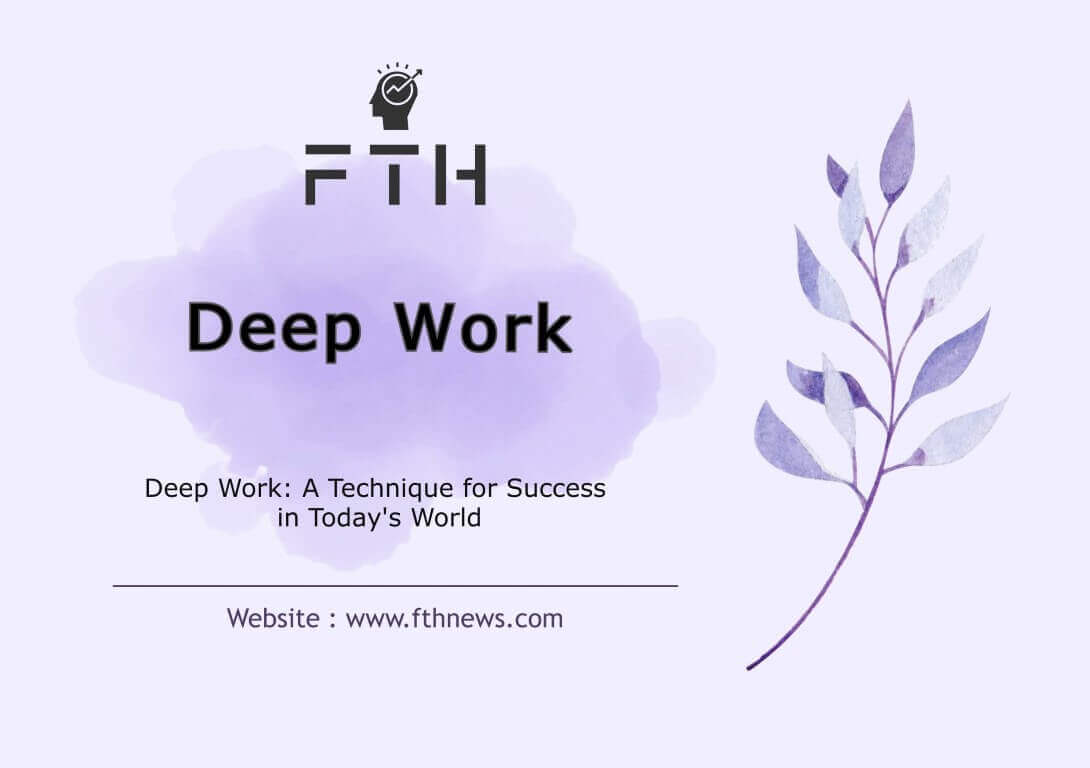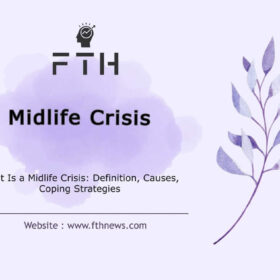
In today’s digital age, the ability to concentrate deeply on demanding tasks is paramount for success and fulfillment. According to Cal Newport, a professor at Georgetown University and bestselling author, the key to thriving in this era is mastering the art of deep work. In his book, “Deep Work: The Rules of Focused Success in a Distracted World,” Newport explores why deep work is crucial and provides practical strategies for achieving it. Let’s dive into what deep work is, its distinction from shallow work, and how to incorporate it into your life effectively.
What is Deep Work?
Deep work is a concept coined by Cal Newport, referring to the ability to focus intensely on cognitively demanding tasks without distraction. It involves immersing oneself fully in activities that require deep concentration, creativity, and problem-solving skills. Deep work is characterized by sustained periods of uninterrupted focus, during which individuals can achieve a state of flow and produce high-quality work.
Key aspects of deep work include:
- Concentration: Deep work requires undivided attention and mental engagement with the task at hand. It involves shutting out distractions and maintaining focus on a single activity for an extended period.
- Cognitive Effort: Deep work involves tackling complex, intellectually demanding tasks that push the limits of one’s cognitive abilities. It often requires critical thinking, analysis, and creative problem-solving skills.
- Value Creation: Deep work aims to create meaningful outcomes and produce work of high quality. It involves generating new ideas, insights, or solutions that contribute to personal or professional growth.
- Skill Development: Engaging in deep work allows individuals to develop and refine their skills in a particular area. By immersing themselves fully in challenging tasks, they can enhance their expertise and mastery over time.
Overall, deep work is a deliberate practice that prioritizes focused attention and immersion in demanding tasks, leading to enhanced productivity, creativity, and personal fulfillment.
Understanding Deep Work
In his seminal work, Cal Newport defines deep work as the professional activities executed with utmost concentration and devoid of distractions, thereby stretching one’s cognitive capabilities to their zenith. This immersive approach fosters a state of flow where individuals delve into tasks that demand their undivided attention, resulting in the creation of new value, honing of skills, and the generation of unparalleled output that is challenging to replicate.
Examples of deep work encompass a spectrum of endeavors that require profound engagement and mental acuity. From formulating intricate career strategies and delving into complex data analysis to authoring compelling books and immersing oneself in intensive learning sessions, the essence of deep work lies in the pursuit of endeavors that demand sustained focus and intellectual rigor.
Implementing Deep Work Strategies:
Newport offers a diverse array of approaches to seamlessly integrate deep work into one’s daily routine, catering to various lifestyles and preferences:
Monastic Style:
Embracing a lifestyle that prioritizes solitude and deep concentration, individuals adopting the monastic style distance themselves from external distractions and immerse fully in their work. By minimizing interactions and external influences, they create an environment conducive to sustained focus and cognitive immersion, enabling profound insights and unparalleled productivity.
Bimodal Approach:
The bimodal approach entails alternating between periods of intense deep and regular daily activities, allowing for focused immersion during dedicated retreats. By carving out designated time blocks for deep work retreats, individuals can cultivate an environment of uninterrupted concentration, fostering creativity, innovation, and mastery in their chosen endeavors.
Rhythmic Routine:
Establishing a rhythmic routine involves creating consistent daily rituals for deep work, dedicating specific time blocks to concentrated effort while minimizing distractions. By adhering to a structured schedule and allocating dedicated periods for deep job, individuals cultivate a habit of sustained attention, enhancing productivity, and achieving optimal performance in their endeavors.
Journalistic Method:
The journalistic method advocates seizing opportunities for deep as they arise within the context of a busy professional schedule, prioritizing focus and concentration in short bursts. By capitalizing on fleeting moments of solitude and cognitive clarity, individuals can maximize productivity and creativity, even amidst a whirlwind of external demands and distractions.
Regardless of the chosen approach, the key lies in cultivating intentionality and discipline in one’s daily practices, prioritizing deep, focused engagement over superficial busyness. By embracing these strategies and integrating deep work into their routine, individuals can unlock their full potential, transcend distractions, and embark on a journey of sustained growth, creativity, and fulfillment.
Strategies for Deep Work: How to Cultivate Deep Work
Cal Newport provides a comprehensive roadmap for integrating deep job into daily life, comprising a set of key principles aimed at fostering a culture of focused concentration and productivity:
1. Work Deeply:
Allocate dedicated time for work sessions and commit to focusing exclusively on challenging tasks. By immersing yourself fully in demanding endeavors without distractions, you can harness your cognitive potential and achieve optimal performance in your work.
2. Embrace Boredom and Fatigue:
Acknowledge the discomfort that may arise during deep job sessions and view it as a natural part of the process. By embracing moments of boredom and fatigue as opportunities for growth and self-improvement, you can cultivate resilience and fortitude in your pursuit of deep, meaningful work.
3. Minimize Distractions:
Limit exposure to distractions, including social media and unnecessary digital communication, to create an environment conducive to deep work. By creating physical and digital boundaries to shield yourself from interruptions, you can create a sanctuary for focused concentration and cognitive immersion.
4. Prioritize Meaningful Tasks:
Focus your time and energy on tasks that align with your long-term goals and provide substantial value, avoiding shallow or trivial activities. By discerning between tasks that contribute to your overarching objectives and those that merely fill time, you can optimize your productivity and make meaningful progress towards your aspirations.
In addition to Newport’s principles, here are additional strategies for cultivating deep work:
Set Clear Goals:
Define specific, actionable objectives for your deep work sessions to maintain focus and direction. By clarifying your intentions and desired outcomes, you can channel your energy towards tasks that align with your priorities and aspirations.
Eliminate Distractions:
Minimize interruptions by turning off notifications, finding a quiet workspace, and setting boundaries with colleagues and family members. By creating a conducive environment for deep work, you can optimize your cognitive resources and maximize your productivity.
Establish Rituals:
Develop rituals or routines that signal to your brain that it’s time to enter deep work mode, such as a designated workspace or a specific time of day. By establishing consistent cues and rituals, you can prime your mind for focused concentration and enhance your capacity for deep, immersive work.
Practice Mindfulness:
Cultivate mindfulness techniques, such as meditation or deep breathing exercises, to quiet the chatter of the mind and enhance your ability to concentrate. By cultivating a present-moment awareness and grounding yourself in the here and now, you can overcome distractions and deepen your engagement with your work.
Schedule Regular Breaks:
Take periodic breaks to recharge and avoid burnout, but ensure they’re planned and purposeful to maintain momentum. By incorporating restorative activities into your routine, you can replenish your energy reserves and sustain your focus over extended periods of deep.
By integrating these strategies into your daily routine and mindset, you can cultivate a culture of deep work that fosters creativity, productivity, and fulfillment in your professional and personal endeavors.
Deep Work vs. Surface Work:
Deep work and surface work represent two distinct modes of engagement with tasks, each yielding vastly different outcomes and impacts on productivity.
characterized by intense concentration and cognitive immersion, involves tackling complex, intellectually demanding tasks with undivided focus.
Activities such as strategic planning, in-depth research, creative problem-solving, and skill development epitomize the essence of this work. In contrast, surface work encompasses routine, non-cognitive tasks that are often performed without full concentration or engagement. Activities like checking emails, managing calendars, responding to routine inquiries, and attending to administrative duties fall into this category.
While surface work may appear essential for managing day-to-day responsibilities, it tends to perpetuate distractions, fragment attention, and impede the capacity for deep, focused engagement.
Moreover, the repetitive nature of surface work can foster a sense of busyness without meaningful progress, leading to a cycle of shallow productivity and diminished cognitive abilities. While surface work may seem unavoidable in the modern workplace, its pervasive nature poses a significant challenge to the cultivation of this work.
By recognizing the distinction between these two modes of work and intentionally prioritizing deep, focused engagement over superficial busyness, individuals can transcend the limitations imposed by distractions and unlock their full potential for creativity, productivity, and fulfillment.
Why Deep Work Matters
In today’s hyper-connected world, where our attention is incessantly fragmented by a barrage of emails, social media notifications, and other distractions, the ability to engage in deep work has become more crucial than ever before. These constant interruptions not only impede our capacity to accomplish meaningful work but also erode our cognitive faculties and diminish our overall well-being.
Deep emerges as a beacon of hope amidst this modern dilemma, offering a potent antidote to the pervasive culture of distraction. By cultivating the practice of this work, individuals can reclaim their focus, elevate their productivity, and chart a course towards more fulfilling and purpose-driven lives.
Deep work isn’t merely about shutting out external distractions; it’s about fostering a state of deep concentration that allows us to immerse ourselves fully in cognitively demanding tasks. In doing so, we tap into our innate potential, unlocking creativity, innovation, and mastery in our chosen fields. Moreover, by transcending the shallow busyness that pervades our digital age, this work enables us to cultivate a profound sense of satisfaction and fulfillment derived from meaningful accomplishments and sustained focus.
In essence, deep isn’t just a productivity hack; it’s a transformative practice that empowers individuals to thrive amidst the chaos of the digital age, reclaiming control over their attention, time, and ultimately, their lives.
The Benefits of Deep Work
deep work isn’t just a strategy for boosting productivity; it’s a transformative practice that elevates every aspect of our professional and personal lives, empowering us to unlock our full potential and embark on a journey of growth, creativity, and fulfillment.
Enhanced Productivity:
By liberating ourselves from the shackles of constant distractions and immersing fully in a task, deep work empowers us to accomplish more in less time and with heightened efficiency. With undivided focus, we can channel our energy towards tasks that truly matter, maximizing our output and achieving our goals with precision and efficacy.
Improved Concentration:
Through regular practice of this work, we fortify our ability to concentrate, honing our mental faculties to navigate complex challenges with ease and clarity. By cultivating a habit of sustained attention, we sharpen our cognitive skills, enabling us to delve deeper into problems, analyze intricacies, and unearth novel insights that elude the distracted mind.
Heightened Creativity:
Deep work nurtures a state of flow—an immersive state of consciousness where our minds are fully engaged and ideas flow freely. In this heightened state of creativity, barriers dissolve, and innovative solutions emerge effortlessly. Freed from the constraints of external distractions, we tap into our creative reservoirs, birthing breakthrough ideas and pioneering new paths in our endeavors.
Greater Satisfaction:
Engaging in deep offers more than just productivity gains; it provides a profound sense of satisfaction and fulfillment derived from meaningful, challenging work. Unlike the fleeting gratification of shallow tasks, the satisfaction derived from this work is enduring and deeply gratifying. As we immerse ourselves in endeavors that align with our passions and purpose, we experience a sense of accomplishment that transcends the mundane and fuels our drive for excellence.
Examples of Deep Work:
Examples of deep work encompass a spectrum of endeavors that require profound engagement and mental acuity. These activities demand sustained focus and cognitive immersion, resulting in the creation of new value, honing of skills, and the generation of high-quality output. Some examples include:
- Conducting in-depth research for a groundbreaking academic paper.
- Crafting a comprehensive strategic plan for long-term business growth.
- Engaging in creative brainstorming sessions to develop innovative solutions.
- Writing a thought-provoking article or book that challenges conventional wisdom.
- Designing and coding a complex software application from scratch.
Deep Work with ADHD
Deep work, characterized by sustained focus and concentration on cognitively demanding tasks, can pose unique challenges for individuals with Attention Deficit Hyperactivity Disorder (ADHD). However, with tailored strategies and accommodations, it’s possible for individuals with ADHD to engage in this work effectively. Here’s how:
Understanding ADHD Challenges:
Individuals with ADHD often struggle with maintaining attention, regulating impulses, and managing distractions. Recognizing these challenges is the first step towards implementing effective strategies.
Creating a Distraction-Free Environment:
Minimizing distractions is essential for individuals with ADHD to engage in this work. This may involve setting up a designated workspace free from noise, clutter, and visual stimuli that can derail focus.
Utilizing Time Management Techniques:
Breaking tasks into smaller, manageable chunks and using techniques such as time blocking or the Pomodoro Technique can help individuals with ADHD maintain focus and stay on track.
Incorporating Movement Breaks:
ADHD is often associated with hyperactivity and restlessness. Incorporating short movement breaks into this work sessions can help individuals with ADHD manage energy levels and maintain focus.
Implementing External Supports:
Tools such as noise-canceling headphones, task management apps, or visual timers can provide external cues and structure to support focus and productivity.
Practicing Mindfulness and Self-Regulation:
Mindfulness techniques, such as deep breathing or progressive muscle relaxation, can help individuals with ADHD manage impulsivity and regulate emotions, facilitating deeper engagement in tasks.
Seeking Professional Support:
Working with a therapist or coach specializing in ADHD can provide personalized strategies and support for managing symptoms and optimizing productivity.
By implementing these strategies and leveraging their strengths, individuals with ADHD can harness their creativity, resilience, and unique perspective to excel in this work despite the challenges posed by their condition.
Conclusion
In a world where attention is the most valuable currency, mastering deep work is the key to unlocking your full potential and achieving extraordinary results. By cultivating the ability to focus deeply on meaningful tasks, you can transcend the noise and distractions of modern life and carve out a path to success on your own terms. So, embrace the challenge, commit to the journey, and watch as deep work transforms not only your productivity but also your life.














